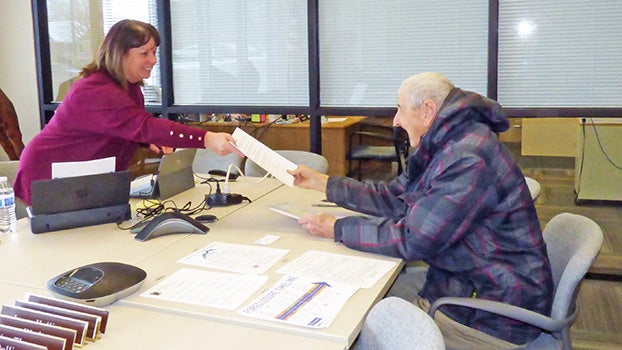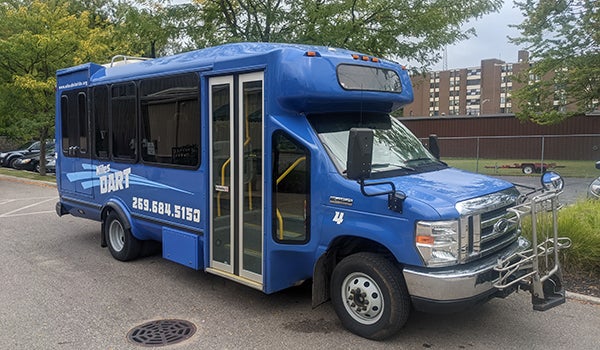Berrien County Treasurer helping taxpayers avoid foreclosure
Published 10:53 am Saturday, March 2, 2024

- Berrien County Treasurer Shelly Weich gives paperwork to Donald Nichols of Niles. Nichols came to get help for a property he inherited. (Debra Haight | Leader Publications)
|
Getting your Trinity Audio player ready...
|
ST. JOSEPH — In tough economic times, losing one’s home for nonpayment of back taxes can be a real possibility for the most vulnerable members of society. Berrien County Treasurer Shelly Weich understands that and her office has been working to help people find ways to stay in their homes.
Weich is carrying on the payment plan tradition set by her predecessor Bret Witkowski in helping property owners facing foreclosure. While all counties in Michigan now offer payment plans to people with delinquent taxes, Witkowski started the practice here in Berrien County before most if not all other counties.
Witkowski said this week that he actually started offering payment plans to people before the Great Recession of 2008. “I remember getting criticized for doing it,” he said. “Then, when the Great Recession hit, many of them asked me how I did it and now it is standard around the state.”
Weich is in her second year of visiting locations around the county in the two months prior to the annual March 31 deadline for redemption after three years of unpaid taxes. That is when ownership of properties transfers to the county. The practice of going out to communities stopped during the pandemic and started up again last year in 2023.
“We don’t want to take properties to auction,” she said. “Fortunately the number of properties going to auction is going down due to the help we’re giving.”
This year, Weich is making two stops each at five local government offices: in the City of Niles, Niles Township, the City of Buchanan, the City of Benton Harbor and Benton Township. The sessions run from 1-3 p.m. on successive Wednesdays starting Jan. 24 and ending March 27.
The stops at the Niles City Hall took place Jan. 24 and Feb. 28, while the one remaining Niles Township Hall stop will be March 13 after an earlier one was held Feb. 7. Similarly, one more stop remains at the Buchanan City Hall on March 27 after the first one was held Feb. 21.
One Benton Harbor City Hall stop remains on March 6 after the first one was held Jan. 31. The remaining Benton Township Hall stop is set for March 20 after the first one was held Feb. 14.
Weich said she’s been getting a handful of people attending each of the Wednesday sessions so far and plans to continue to hold them in the future. She also meets with people in person at her office in the County Administration Building in St. Joseph or talks to them over the phone to arrange payment plans.
“We thought it would be a good idea to come to actual municipal offices, this is where people are used to coming to pay their taxes,” she said. “It’s especially good for south county residents who may find it hard to get to St. Joseph.”
People stopping by to see her on her Wednesday afternoon sessions will find she’s prepared with a computer and a printer to look up how much is owed, set up the payment plan, provide the paperwork and accept payments. People can also go online to make a payment or visit her office in St. Joseph.
In addition to going to locations in other parts of the county outside of St. Joseph, she is also targeting communities where the foreclosure numbers are higher.
She said the number of foreclosures were higher in Buchanan earlier this year but are now down to around eight properties. In Niles and Niles Township, she said there’s the possibility of 35 and 25 foreclosures respectively.
Overall, she said she expects the total number of foreclosures in Berrien County to be slightly down from past years. Foreclosure rates were higher after the 2020 Covid pandemic which saw people losing their jobs and struggling more to make ends meet.
She noted that a state homeowners assistance fund helped qualified individuals through the end of 2023. “That program helped get people caught up on their property taxes and start over with a clean slate,” she said.
She also checks to make sure that people are aware of other assistance that’s out there. For example, she will ask people about their income level to see if they are eligible for a poverty exemption. “Sometimes people don’t know about other programs,” she said. “We have them look at everything and help them the best we can.”
Weich said another tool that’s out there to help people having trouble paying property taxes is a property tax savings account offered by United Federal Credit Union. People can save throughout the year to make sure they have the money at the end of the year to pay their property taxes.
Payment plan agreements she reaches with taxpayers are usually for one year but can be revisited if it’s needed. “Payment plans are a yearly agreement that we revisit if there’s still a need so people will be able to stay in their properties,” she said.
“Our goal is for them to pay off at least some of what they owe in a year,” she added. “We also try to accommodate them, we don’t want to strap them too much.”
As for how people get into the situation where they face foreclosure, she said that’s often because people have lost a job, they’ve gotten sick or there’s been a death in the family and they’ve inherited a property.
Foreclosure is a three year process. In the first year of delinquent taxes, unpaid taxes are turned over to the county treasurer for collection and interest and fees start to be added. Properties are forfeited to the county and a lien is recorded in the second year of unpaid taxes with more fees and interest added.
The second year also features notification of property owners, publication of the list of properties and personal visits to properties. Foreclosure comes in the third year when a judge signs the foreclosure order in February and the redemption period ends on March 31. Foreclosed properties are sold in an online auction in July of that year.






